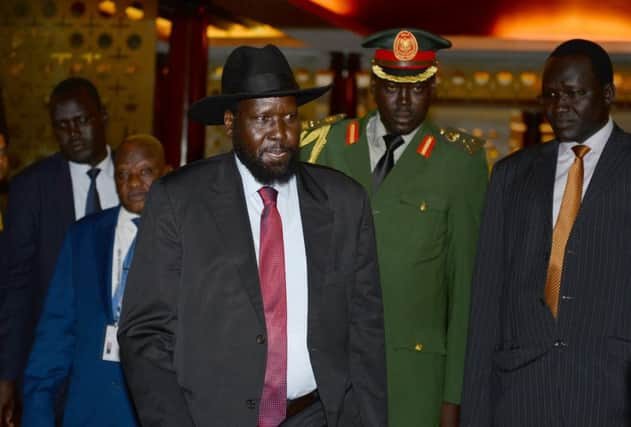South Sudan president linked to cannibalism murders


President Salva Kiir’s faction in the conflict is also accused of recruiting an irregular tribal force before the outbreak of war in December 2013.
The report, released late on Tuesday, also disputes that there was a coup attempt that month by former Vice President Riek Machar. Government troops carried out organised killings of members of the ethnic Nuer in Juba, the capital, the report said.
Advertisement
Hide AdAdvertisement
Hide AdWhen violence broke out, Machar, a Nuer, became a rebel leader. He and Kiir, an ethnic Dinka, recently signed a peace agreement.
African Union investigators, led by former Nigerian President Olusegun Obasanjo, found that the conflict began as a skirmish broke out between Dinka and Nuer soldiers of the presidential guard following political tension between Kiir and Machar, who had been fired as Kiir’s deputy the previous July.
The report was scheduled for release months ago but its release was delayed by the African Union’s Peace and Security Council.
Hundreds of Nuer men were rounded up and shot, and mass graves were discovered.
Perpetrators – described as government forces or their allies – allegedly tortured their victims, including by forcing them to jump in fires or eat human flesh, according to the report.
The killings were “an organised military operation that could not have been successful without concerted efforts from various actors in the military and government circles,” the report said.
“Roadblocks or checkpoints were established all around Juba and house to house searches were undertaken by security forces.
“During this operation male Nuers were targeted, identified, killed on the spot or gathered in one place and killed.”
Advertisement
Hide AdAdvertisement
Hide AdThe report said Minister of Defence Kuol Manyang Juuk described a shadowy “group [that had] organised itself as Rescue the President. It killed most people here [in Juba] – from 15th to 18th. It was even more powerful than organised forces.”
The group comprised some Dinka soldiers who had been mobilised following a 2012 border crisis with northern neighbour Sudan. Some of these soldiers were moved south to Kiir’s private farm near Juba in 2013 and later participated in the killings, the report said, citing interviews with informants.
Amid the Juba killings, Machar fled the capital and mobilised an insurgency which committed revenge attacks against the Dinka, sparking a cycle of violence in Bor, Malakal and Bentiu towns which also included rape and murder of people in churches and hospitals, according to the report.
Kiir and Machar signed a peace agreement in August, but fighting continues.